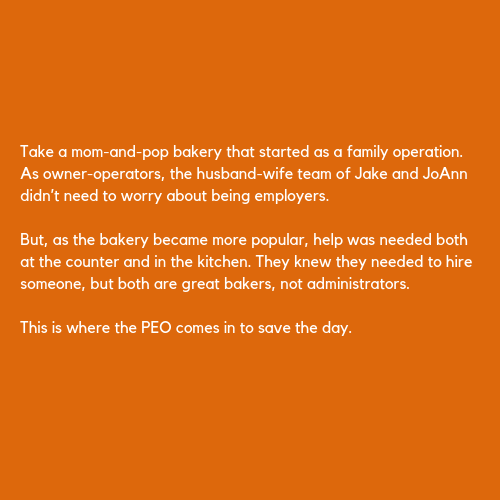
What is a PEO, and what do they do?
Learn what a Professional Employer Organization is, how they work, and how to determine if one is right for you.
When a small business owner fully understands what PEO stands for, he or she can better plan and strategize resources. This is not limited to his own personal benefits but how to grow his business to attract talent without overburdening the company budget.
A Professional Employer Organization (PEO) is the easiest way to accomplish HR outsourcing while still keeping a positive and cohesive corporate culture.
Professional Employer Organization (PEO) Basics
What does PEO stand for? A Professional Employer Organization (PEO) provides human resources services for small to mid-sized businesses. The HR solutions are comprehensive and include payroll, tax administration, regulatory compliance, insurance, and benefits packages.
PEOs can provide these benefits at a lower cost to a business than if a company tried to incorporate all of this on its own. This is achieved through employee pooling and resource bundling.
This is more than a third-party human resources provider contracted to do specific services, though some PEO companies do have different bundling and a la carte services. The PEO becomes a business partner to the client company and is responsible for the hiring and human resources administration of all employees. This gives the PEO many more employees than just one company, where the cost benefits are derived.
The PEO doesn’t pick employees for you, helps you to set up effective hiring practices, then handles everything once you’ve decided on the perfect candidate.
Client Companies and Employee Leasing
People at a community desk working.
The PEO is the employer of record when it comes to IRS tax compliance and filings. The client company then leases the employees back from the PEO. It may seem odd to bring a company to hire your employees and lease them back to you; after all, logic would suggest this becomes a more expensive way to do things.
The PEO would have to charge you a premium for your own employees, right?
No. The PEO makes its money through the services it actually provides as the employer of record, often per employee per month. This cost allows the PEO to facilitate the pooling of employees to get the best possible rates for health insurance, payroll services, workers’ compensation insurance, and retirement plans. Administration costs are shared with a large pool of client companies and their employees, making it cost-effective.
Understanding Outsourcing Human Resources for Small Business
Many small business owners start with a bootstrap budget and forego the extras of personal benefits in the early stages of a business. As a business grows, a small business owner needs to consider his own long-term benefits to protect him and his family in the event of illness or injury and ideally to save for a comfortable retirement outside the business's success.
On top of this, hiring even just a few employees as a company grows often puts a small business owner in unfamiliar territory when it comes to the legal side of human resources.
An example of how a PEO can help.
There are many rules and regulations every employer must follow to remain in compliance with both state and federal labor laws. Federal employment taxes, workers’ compensation insurance, and unemployment taxes are just a few of the areas in which a small business owner might not be versed in completing himself.
By taking on the task of payroll that includes federal employment taxes and providing workers’ compensation and health insurance benefits, Jake and JoAnn can remain compliant. Their time is better spent sharing the secrets of baking success and customer service with their new help to add more dollars to the bottom line. The PEO became the investment in their business that paid for itself by allowing them to focus on what they are already great at doing.
Outsourced HR Services
A PEO is not a new concept but has grown in popularity since the passing of the Affordable Care Act (ACA) with outsourcing human resources. The Health Care Act stated that everyone has to have health insurance and that employers with 50 or more employees to provide it. This caused significant financial concern for many small business owners and sole proprietors who avoided health insurance costs.
PEOs have become the best solution for this and have proven to be more than just a partner to help fulfill a federal requirement. Small businesses that utilize PEO services grow an average of seven to nine percent faster than those doing it independently.
Additionally, these PEO client partners are seeing less turnover and greater employee satisfaction on the job.
Consider how the PEO accomplishes this for its partners:
Employee Benefits
By providing employee benefits, a company can attract better talent. Recruiting is hard in today’s global market, and talented people will choose the best offer that fulfills their entire family’s needs. In some cases, someone will accept a lower-paying job if benefits are offered because the cost of health and disability insurance can be more than a thousand dollars monthly for a small family.
With the help of a PEO, a small business can compete with major corporations by offering comprehensive health care and other benefits for pennies on the dollar compared to administering it on their own.
It’s also easy since the PEO takes care of everything, including enrollment questions. The small business owner is also eligible to sign up and gets to enjoy the same benefits as his employees.
Health Insurance
The average monthly cost of health insurance for a family of four is $1,768. Some states are more expensive than others, and health plan options will increase this cost. For a self-employed business owner, the added cost of health insurance without subsidies purchased on his own is cost-prohibitive.
By using a PEO provider health insurance plan, the self-insured business owner can pool his own risk with other employers within the PEO. This drives costs down.
This is the significant advantage of the PEO in today’s mandated health insurance environment. Small business owners have used the PEO to adapt to the new regulatory environment.
Mid-sized businesses with 50 or more employees don’t need to shop and search for the right health insurance plan or provider. Additionally, many independent contractors and sole proprietors who don’t need many other services find the PEO relationship is well worth it just for the health insurance coverage.
Workers’ Compensation
Every state, except for Texas, has laws requiring anyone who has even one part-time employee to maintain workers’ compensation insurance. New York law requires employers to have valid workers’ compensation or potentially face either a $10,000 fine or 18 months in prison. California holds similar penalties for non-compliance with these employee insurance laws.
Workers’ compensation insurance premiums can be very expensive, depending on what a company does. The insurance is based on payroll and the job duties of employees. Thus, a clerk might cost .12 cents per $100 of payroll, while a plumber might be more than $3 per $100 of payroll.
The PEO provider can help mitigate some of these costs through master policies. Client companies must still maintain safety standards and will see premiums increase if there are claims. Still, increases will typically be much smaller since claims are also calculated over the aggregate employee population. The PEO is also there to help implement safety programs to reduce claims and keep costs down.
Payroll Processing
Payroll processing is one of the biggest headaches for small business owners because there is a level of stress to ensure compliance with state and federal employment taxes. Most small business owners hire third-party payroll benefits providers to handle cutting checks, itemizing federal and state taxes, and the various withholding requirements for each employee. The small business owner needs only to fund the payroll account, and the PEO will do the rest.
Payroll benefits are included in the HR services provided by a PEO. Services are included in the cost-per-employee, thus, aren’t exorbitantly more to sign with a PEO compared to only hiring a payroll company such as Paychex or ADP.
Employee Development and
Compliance Issues
HR management includes employee development and compliance with all employment laws. A PEO is the record keeper of all employee files, including hiring paperwork, tax form completion, payroll and compensation benefits, and notations of merit as part of the employee’s permanent record with the company.
Beyond just record-keeping, the PEO provider can also deliver employee training on compliance issues such as discrimination training, privacy protection, and customer service. The small business owner can focus on operations without having to invest in other programs or do the training himself constantly.
This not only keeps him in compliance but removes him from the process; this allows certain types of leadership styles such as a coach or visionary leader to focus on personal leadership strengths and not muddy his relationships and leadership style with compliance training.
Working as Co-Employers
The PEO and client company work as co-employers. The client company is responsible for the day-to-day management of the leased employees and can fire someone at any time based on employment contracts. The PEO is the administrative arm of the relationship. This might seem somewhat odd and it can be, if the PEO and the small business don’t maintain similar core values as their employers.
The PEO becomes an extension of the company culture. Most employees enjoy the benefits of what a PEO offers them and will quickly adapt to PEO online platforms to obtain payroll tax data, insurance and other benefits information. That being said, this requires trust on the part of the client company to know that the PEO is taking care of its employees with excellent customer service.
Many small business owners operate with a very tight-knit corporate culture where employees are considered part of the family. The PEO is someone outside the family, like a family friend, caring for them. Customer service issues with the PEO becomes a reflection on the employer and can lead to frustration on the part of employers and employees. Getting the right PEO services provider is critical.
Three men and two women working at a community desk.
PEO: Beyond the Acronym
It is easy to state what PEO stands for when simply breaking it down by its acronym translation: Professional Employer Organization. However, the PEO stands for much more to smart business owners thinking about long-term growth and personal financial health. PEO partners allow business owners to focus on the things they are best at and eliminate the headaches (and risk) of learning administrative tasks that should really be left for professionals.
Outsourcing is being done by more and more large companies. The gig economy is here to stay with technology making it easier than ever for remote employees and contractors to get tasks done.
This creates a great opportunity for small business owners who want to build a company with the best talent. A PEO that works across state lines makes hiring outside of a business’ immediate geographic location feasible and compliant.
Choosing the Right PEO Relationship
There are a lot of PEO providers a small business owner can select from to find the right partner. Don’t just look at the costs involved, but also consider the added benefits, experience and synergy of company values with PEO providers. Remember they are an extension of the company culture.
The most popular Professional Employer Organization (PEO) providers include:
When shopping for the right PEO solution, use a PEO broker who will work on your behalf. PEO brokers don’t charge you but are instead paid by the PEO you are placed with. Their job is to find the right solution for the right price for your business.
Not only will a PEO broker assist you with the right choice, but he will also help review the platforms and prepare you to transition from your existing methods of running payroll and insurance into the more efficient PEO system. If you would like us to help, let’s chat.








